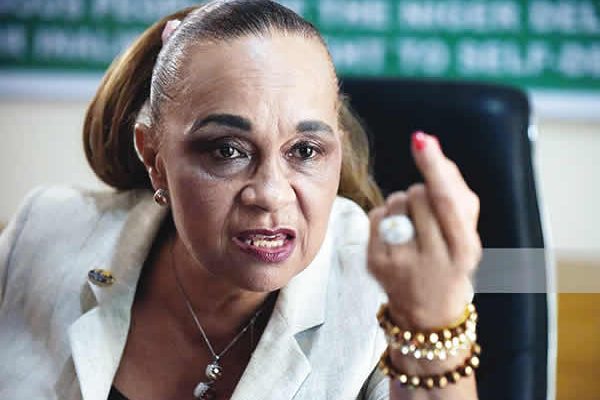
Despite the growing consensus by the majority on the need to restructure the country, not a few think that the nation needs more than that to move forward. One of those in that class is an environmental and human rights activist, Annkio Briggs. Even though she used to be one of the vocal advocates of restructuring, she now believes that only a referendum would save the nation. In this interview with WILLY EYA, she speaks on major issues of public discourse.
Nigeria is currently going through a turbulent period with tension building from one end of the country to the other. Among the people, there are all manners of hate speeches and echoes of disintegration. If you take a critical look at the development, what would likely be your conclusions?
I’m just exhausted in the sense that I cannot believe what is happening to us, a country like Nigeria with the quality and capacity of the people we have? I am shocked that the educated, exposed people all over Nigeria and particularly in the southern part of the country and specifically in the Niger Delta do not realize that it is not politics that is going to answer the question that everybody is asking today. What is going to answer the question is truth. We must speak truth to ourselves. As far as I am concerned, a southerner whether he is an Igbo man, a Yoruba man, Ijaw man, Isoko man, Ikwere man and so on must speak the truth to himself. If we speak truth to ourselves, then we have to answer the question of what do we really want?
Nigeria has already cracked and the cracks are very clear. What people are trying to do is to continue to patch the crack with cement and it is not going to hold. We must tell ourselves the truth and in telling ourselves the truth, we have to decide what we want as a people. Now, look at what our people are saying today; the Igbo for instance, I agree that not all of them are saying they want to go but some are saying they do not want to go. This is why there is a need for a referendum. In the Niger Delta, you have Isoko, Urhobo, Ijaw, Ikwere, Ogoni and so on, they do not all want the same thing; therefore you must give them the opportunity to decide what is it that they want. That is why a referendum is important.
The Yoruba must have a referendum among themselves; the Fulani must have a referendum, the Middle Belt must also have a referendum.This is because we started the struggle for justice and equity at different times. Late Adaka Boro declared a war that lasted 12 days before even the first coup in Nigeria took place. That shows very clearly that somebody somewhere felt that there was an injustice being done to his people.
Then you have the issue of Biafra, the annulment of June 12, 1993 election won by MKO Abiola and so many of such issues. All of these things put pressure on the unity of the country and the desire of people whether they want to stay in Nigeria or not.
We cannot continue to pretend about the fact that this country has 36 states with six geo-political zones arrangement and over 400 ethnic nationalities, and that this country is clearly divided by ethnicity and religion. We are pretending that we are one people; we are not. We must find a solution and that solution lies squarely in equity, justice and liberty. If we have all those things in place, we would not be hearing the issue of resource ownership, we would not be hearing the issue of restructuring and referendum. This is because if we have equity, justice and liberty based on truth and the fear of God, you would see that people would do what is in their best interest. That is the only way the country can survive. But if those three issues I mentioned are lacking, even if it is one out of the three that is lacking, you would continue to have problems. In a situation where you have a country where one side has 19 states and the other has 17; you have a situation where one side has more lawmakers at the National Assembly as their representatives; if you have a country ‑where one region has more local governments in a state like Kano that does not produce any revenue, there would be resistance and tension.
They are sharing in the oil and gas which is the only revenue that Nigeria is generating. Nigeria is not doing anything else except oil and gas. We are not exporting yam and bringing it to the centre to share. The exportation of yam is a personal business. So, the only people producing anything are the six oil producing states, then Imo and Abia states in the South East and Ondo State in the South West. If you add the three to those of the Niger Delta, that is nine oil producing states.
The revenues by Cross River state are offshore. Now, if you put all these things on one side, then you have a country that is sharing the resources of nine or ten states. And bearing in mind that what Lagos State is boasting of today is also coming directly from oil and







